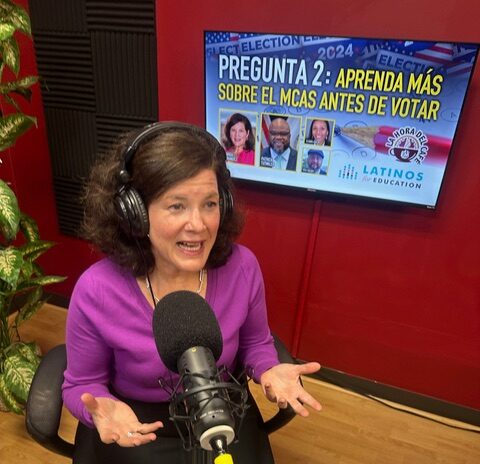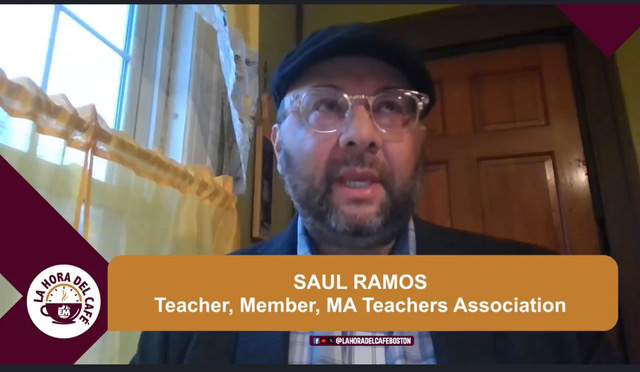
By Brian Wright O’Connor
A spirited and civil debate took place Wednesday morning on El Mundo Boston’s livestreamed “La Hora del Café” show on a Massachusetts ballot question to eliminate the MCAS standardized test as a requirement for high school graduation.
Voters going to the polls on Nov. 5 will have the choice of ending the 21-year reign of the Massachusetts Comprehensive Assessment System as a gateway to earning a public high school diploma by voting yes on the question. A no vote will leave the system as it is.
The show was a collaboration between El Mundo Boston and the national non-profit Latinos for Education.
Amanda Fernandez, the chief executive officer and founder of Latinos for Education, said it is imperative that Latino voters “understand what both sides would like to see.”
“We want to make sure our audience really understands what their vote means. Our Latino community needs to be informed of this important issue,” said Fernandez, who helped moderate the lively back-and-forth discussion between the state secretary of education and a public-school teacher.
Fernandez and show host Alberto Vasallo III kept the banter upbeat and substantive in an effort to better inform the audience about the high stakes of the important ballot question.

Massachusetts Secretary of Education Patrick Tutwiler, a member of Gov. Maura Healey’s cabinet, said the MCAS exam has served as a useful benchmark for over two decades and has helped the state rise to the top of public education systems across the country.
“If Question 2 passes, we will take away a system that has worked for 20 years,” he said. “If Question 2 passes, we will no longer have a uniform system of accountability. It means that we no longer have a system where a student graduating with a diploma from Wayland is the same as a student graduating with a diploma from Lawrence.”
Saúl Ramos, a teacher of the visually impaired and a member of the Massachusetts Teachers Association – which sponsored the ballot question – pointed out that the question would not make 10th grade MCAS tests go away but simply eliminate passage as a graduation requirement.
“You’ll still have your scores to do your evaluation,” said Ramos. “It is not fair that students who do well in their classes, students who are intelligent but have difficulty with standardized tests are not allowed to graduate.”

The MTA has argued that MCAS acts as a roadblock to broadening the curriculum by narrowing instruction to teach to the test. Minority students and English learners consistently show lower scores on the statewide exam.
MCAS tests were introduced to Massachusetts after passage of the landmark 1993 Education Reform Act but did not become a graduation requirement until 2003.
If Question 2 passes, Massachusetts would be one of only three states in the country without a standardized requirement for graduation.
Tutwiler conceded Ramos’s point that Question 2 will not mean the end of MCAS testing. “But if MCAS is eliminated as a requirement, students will not take the test seriously,” he said, suggesting that the test’s utility as a comparative standard will be undermined.
The education secretary said that the MCAS passage rate was just 50% before it became a graduation requirement and almost immediately shot up to 85% after the passage mandate kicked in.
Ramos, pushed back. “Saying students won’t take it seriously is insulting,” he said. Besides, he added, “They’ve been tested for 12 years. Why add additional pressure and stress on students who don’t test well?”
Tutwiler emphasized the role of MCAS testing as a way to evaluate not only students but teachers and the curriculum as well. “Students who don’t perform well on the MCAS in 10th grade have not been adequately prepared,” he said.
The education secretary also pointed out that out of the 70,000 students who take the test only 700 fail to pass and that out of that number, 300 are students who have been in the country less than 5 years.
“Only about 1% of those who take the test don’t receive their diploma as a result of the MCAS,” said Tutwiler.
Ramos countered that even if it was one student, it is important to have a better way of eliminating an unfair barrier to students with special needs, language deficiencies or those who simply don’t test well, but by all other metrics are fully fit to graduate.
Tutwiler stressed that if the MCAS is eliminated, there will not exist any uniformed manner in which to properly gauge students.







